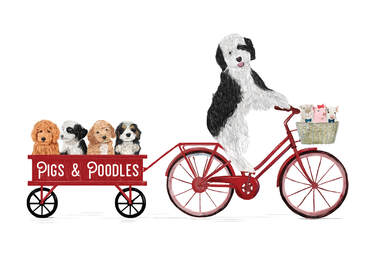PUPPY STAGES
General guidelines for puppies' stages of development:
Birth to Two Weeks:
Neonatal Period. Puppy is most influenced by his mother. Senses of touch and taste are present at birth.
Two to Four Weeks:
Transitional Period. Puppy is most influenced by his mother and brothers and sisters. Eyes open, teeth begin to come in, and senses of hearing and smell develop. Puppy begins to stand, walk a little, wag tail, and bark. By the fourth or fifth week, eyesight is well-developed.
Three to Twelve Weeks:
Socialization Period. During this period, puppy needs opportunities to meet other dogs and people.
Ranking Period. Puppy is most influenced by "playmates," which may now include those of other species. Puppy begins to see and use ranking (dominance and submission) within the household (the puppy's "pack"), including humans. Puppy begins teething (and associated chewing). At four months of age, puppy experiences another fear stage.
Six to Eighteen Months:
Adolescence.Puppy is most influenced by human and dog "pack" members. Puppy goes through a second chewing phase when he is about 8 months old - part of exploring territory. During the 7-9 months stage, puppy increases exploration of dominance, including challenging humans. If not spayed or neutered, puppy experiences beginnings of sexual behavior.
Birth to Two Weeks:
Neonatal Period. Puppy is most influenced by his mother. Senses of touch and taste are present at birth.
Two to Four Weeks:
Transitional Period. Puppy is most influenced by his mother and brothers and sisters. Eyes open, teeth begin to come in, and senses of hearing and smell develop. Puppy begins to stand, walk a little, wag tail, and bark. By the fourth or fifth week, eyesight is well-developed.
Three to Twelve Weeks:
Socialization Period. During this period, puppy needs opportunities to meet other dogs and people.
- By 3 to 5 weeks, puppy becomes aware of his surroundings, companions, and relationships, including play.
- By 4 to 6 weeks, puppy is most influenced by littermates and is learning about being a dog.
- From 4 to 12 weeks, puppy remains influenced by littermates and is also influenced by people. Puppy learns to play, develops social skills, learns the inhibited bite, explores social structure/ranking, and improves physical coordination.
- By 5 to 7 weeks, puppy develops curiosity and explores new experiences. Puppy needs positive "people" experiences during this time.
- By 7 to 9 weeks, puppy is refining his physical skills and coordination, and can begin to be housetrained. Puppy has full use of senses.
- By 8 to 10 weeks, puppy experiences real fear involving normal objects and experiences; puppy needs positive training during this time.
- By 9 to 12 weeks, puppy is refining reactions, developing social skills with littermates (appropriate interactions), and exploring the environment and objects. Puppy begins to focus on people; this is a good time to begin training.
Ranking Period. Puppy is most influenced by "playmates," which may now include those of other species. Puppy begins to see and use ranking (dominance and submission) within the household (the puppy's "pack"), including humans. Puppy begins teething (and associated chewing). At four months of age, puppy experiences another fear stage.
Six to Eighteen Months:
Adolescence.Puppy is most influenced by human and dog "pack" members. Puppy goes through a second chewing phase when he is about 8 months old - part of exploring territory. During the 7-9 months stage, puppy increases exploration of dominance, including challenging humans. If not spayed or neutered, puppy experiences beginnings of sexual behavior.
FOR MORE INFO ON HOW TO TRAIN YOUR PUPPY VISIT OUR ONLINE TRAINING SCHOOL !


